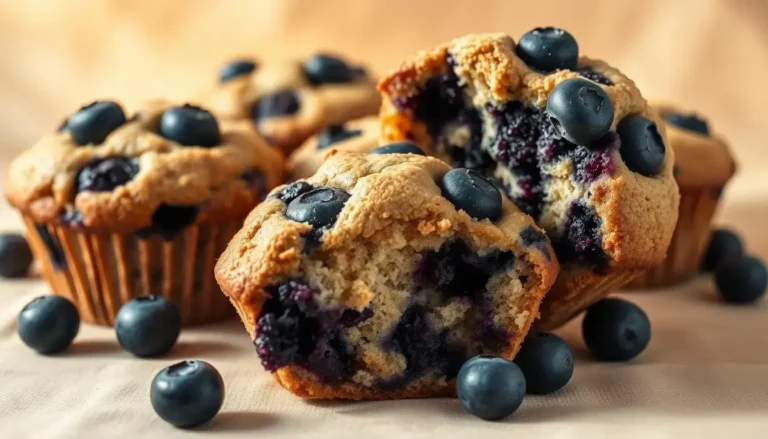Ultimate Guide to High Protein Breakfasts: Fuel Your Day Right
Table of Contents
Starting your day with a high protein breakfast isn’t just a fitness trend—it’s a science-backed approach to improving your overall health, energy levels, and even weight management goals. Whether you’re an athlete looking to build muscle, a busy professional needing sustained energy, or someone trying to manage their weight, this comprehensive guide will show you exactly how to incorporate more protein into your morning routine.
What is Protein and Why is it Important for Breakfast?
Protein is one of the three essential macronutrients (alongside carbohydrates and fats) that your body needs to function properly. Made up of amino acids—often called the “building blocks of life”—protein plays a crucial role in:
- Building and repairing muscles, tissues, and cells
- Supporting immune function
- Creating enzymes and hormones
- Maintaining healthy skin, hair, and nails
- Providing a feeling of fullness and satisfaction
When it comes to breakfast specifically, consuming protein first thing in the morning offers unique benefits that can impact your entire day:
“Eating protein at breakfast helps to stabilize blood sugar levels and provides sustained energy, unlike the quick spike and crash often experienced with high-carbohydrate breakfast options,” explains Dr. Gabrielle Lyon, a functional medicine physician specializing in muscle-centric medicine.
Research published in the American Journal of Clinical Nutrition found that consuming protein at breakfast increases satiety and reduces hunger throughout the day. A 2015 study in the International Journal of Obesity demonstrated that participants who ate a high-protein breakfast consumed fewer calories throughout the day and showed reduced cravings compared to those who skipped breakfast or ate a low-protein morning meal.
Additionally, a morning protein boost kickstarts your metabolism. The thermic effect of food (TEF)—the energy required to digest, absorb, and process nutrients—is highest for protein (20-30%) compared to carbohydrates (5-10%) and fats (0-3%). This means your body burns more calories processing protein than other nutrients.
How Much Protein Should You Eat at Breakfast?

The ideal amount of protein for your breakfast depends on several factors, including your:
- Age and gender
- Body weight and composition
- Activity level and type of exercise
- Personal health goals (weight loss, muscle gain, maintenance)
Here are some general guidelines:
| Population | Protein Recommendation for Breakfast |
|---|---|
| Average adult | 20-30 grams |
| Active individuals | 25-35 grams |
| Athletes/Heavy training | 30-40 grams |
| Older adults (65+) | 25-35 grams |
| Weight loss goals | 25-35 grams |
For perspective, 30 grams of protein for breakfast equates to about:
- 5 eggs
- 1 cup Greek yogurt + 1/4 cup almonds + 2 tablespoons chia seeds
- 1 cup cottage cheese + 2 tablespoons pumpkin seeds
- 3 oz salmon + 2 egg whites
Most nutrition experts now recommend consuming protein consistently throughout the day rather than loading up at dinner, as was common in traditional American diets. Aiming for 20-30 grams per meal (including breakfast) helps maximize muscle protein synthesis and provides better overall nutrition distribution.
How to Get 30 Grams of Protein for Breakfast
Reaching the target of 30 grams isn’t as difficult as it might seem. Here are some practical combinations:
- 3 eggs (18g) + 1 slice whole grain toast (4g) + 1 oz cheese (7g) = 29g protein
- 1 cup Greek yogurt (20g) + 1/4 cup walnuts (4.5g) + 2 tablespoons hemp seeds (6g) = 30.5g protein
- Protein smoothie with 1 scoop whey protein (25g) + 1 cup milk (8g) = 33g protein
- 1/2 cup cottage cheese (14g) + 3 oz smoked salmon (17g) = 31g protein
Top High-Protein Breakfast Food Sources
Animal-Based Protein Sources
Eggs Eggs remain one of the most versatile and nutrient-dense breakfast options available. A single large egg contains about 6g of complete protein along with essential vitamins and minerals.
Greek Yogurt With approximately 15-20g of protein per 6oz serving, Greek yogurt contains nearly twice the protein of regular yogurt. Opt for plain varieties and add your own flavoring to avoid added sugars.
Cottage Cheese Often overlooked, cottage cheese packs an impressive 14g of protein per 1/2 cup serving and pairs well with both sweet and savory toppings.
Lean Meats Turkey bacon (6g protein per slice), chicken sausage (about 14g per link), and Canadian bacon (12g per 2 slices) offer protein-rich alternatives to traditional breakfast meats.
Fish Smoked salmon (approximately 17g protein per 3oz) makes for a luxurious high-protein breakfast addition that also provides heart-healthy omega-3 fatty acids.
Plant-Based Protein Sources
Tofu Firm tofu contains about 10g of protein per 3.5oz serving and can be scrambled with turmeric for an egg-like breakfast dish.
Tempeh With around 16g of protein per 3oz serving, this fermented soybean product has a nutty flavor and firm texture that works well in savory breakfast dishes.
Legumes Black beans (7g protein per 1/2 cup), chickpeas (6g per 1/2 cup), and lentils (9g per 1/2 cup) can form the base of savory breakfast bowls.
Nuts and Seeds Almonds (6g protein per 1/4 cup), pumpkin seeds (8g per 1/4 cup), and chia seeds (5g per 2 tablespoons) make excellent toppers for yogurt, oatmeal, or smoothies.
Protein Powders For those needing a quick high protein breakfast, protein powders (whey, pea, hemp, brown rice) typically provide 20-25g of protein per scoop and can be added to smoothies, oatmeal, or baked goods.
Recipe Ideas for Different Dietary Needs
Vegetarian High-Protein Breakfasts
- Power Breakfast Bowl: 1 cup Greek yogurt topped with 1/4 cup granola, 2 tablespoons chia seeds, 1/4 cup berries, and 1 tablespoon almond butter (25g protein)
- Savory Breakfast Quinoa: 1 cup cooked quinoa mixed with 2 fried eggs, 1/4 avocado, and 1 oz feta cheese (22g protein)
- Protein-Packed Pancakes: Pancakes made with 1/2 cup cottage cheese, 1/2 cup oats, 2 eggs, and topped with Greek yogurt (30g protein)
Vegan High-Protein Breakfasts
- Tofu Scramble: 4oz firm tofu scrambled with nutritional yeast, spinach, and black beans, served with 1 slice whole grain toast (25g protein)
- Protein-Rich Overnight Oats: 1/2 cup oats soaked overnight with 1 cup soy milk, 2 tablespoons chia seeds, 1 scoop plant protein powder, and topped with nut butter (28g protein)
- Tempeh Breakfast Hash: 3oz tempeh crumbled and sautéed with sweet potatoes, peppers, and onions (20g protein)
Gluten-Free High-Protein Breakfasts
- Sweet Potato Protein Bowl: Roasted sweet potato topped with 2 eggs, avocado, and pumpkin seeds (22g protein)
- Berry Protein Smoothie Bowl: Smoothie made with protein powder, berries, and almond milk, topped with gluten-free granola and hemp seeds (30g protein)
- Breakfast Frittata: 6-egg frittata with spinach, feta cheese, and cherry tomatoes (30g protein)
Low-Carb High-Protein Breakfasts
- Avocado Baked Eggs: 2 eggs baked in halved avocado, topped with crumbled bacon and cheese (22g protein)
- Smoked Salmon Rolls: Smoked salmon rolled with cream cheese, capers, and dill (20g protein)
- Protein Coffee Smoothie: Cold brew coffee blended with protein powder, almond milk, and ice (25g protein)
Tips for Meal Prepping High-Protein Breakfasts

Preparation is key to maintaining healthy breakfast habits. Here are practical tips for meal prepping protein-rich morning meals:
- Batch cook egg muffins: Mix beaten eggs with your favorite proteins and vegetables, pour into muffin tins, and bake. Refrigerate for up to 4 days or freeze for longer storage.
- Prepare overnight protein oats: Combine oats, protein powder, milk of choice, and chia seeds in mason jars. Refrigerate overnight for grab-and-go breakfasts.
- Freeze smoothie packs: Pre-portion smoothie ingredients (excluding liquid) in freezer bags. In the morning, dump into a blender, add liquid, blend and go.
- Cook protein in bulk: Prepare a large batch of chicken, tempeh, or other proteins to add to breakfast bowls throughout the week.
- Hard boil a dozen eggs: Keep them in the refrigerator for a quick protein addition to any breakfast.
“The key to successful meal prep is preparing components rather than complete meals,” suggests meal prep expert Amanda Meixner. “This approach gives you flexibility while still saving time.”
Common Mistakes to Avoid When Making High-Protein Breakfasts
Even with the best intentions, these common pitfalls can undermine your high-protein breakfast goals:
- Relying on protein bars: Many commercial protein bars contain high amounts of sugar and processed ingredients. Choose carefully or make your own.
- Overlooking hidden sugars: Many “protein” yogurts, cereals, and granolas contain excessive added sugars that can spike insulin and increase hunger later.
- Not balancing macronutrients: While protein is important, don’t neglect healthy fats and complex carbohydrates that provide energy and nutrients.
- Protein timing confusion: Some people mistakenly save their protein for later meals. Distributing protein intake throughout the day, starting with breakfast, is more effective for muscle maintenance and hunger control.
- Misunderstanding portion sizes: Underestimating how much food constitutes 25-30g of protein is common. Use measuring tools initially until you can eyeball portions accurately.
The Science Behind High-Protein Breakfasts and Weight Management
The connection between high-protein breakfasts and weight management is well-documented in scientific literature:
A landmark study published in the International Journal of Obesity followed overweight young adults who either: skipped breakfast, consumed a high-carbohydrate breakfast, or ate a high-protein breakfast (containing 30g protein). After 12 weeks, only the high-protein breakfast group showed significant reductions in daily hunger, decreased daily food intake, and reduced body weight.
Another study in the American Journal of Clinical Nutrition found that increasing protein intake from 15% to 30% of total calories resulted in spontaneous reduction in calorie intake and significant weight loss.
The mechanisms behind these effects include:
- Increased satiety hormones: Protein stimulates the release of GLP-1, PYY, and CCK—hormones that signal fullness to your brain.
- Decreased ghrelin: High-protein intake suppresses ghrelin, your body’s primary hunger hormone.
- Higher thermic effect: As mentioned earlier, protein requires more energy to digest than carbs or fats, slightly increasing daily calorie expenditure.
- Preservation of lean muscle mass: Higher protein intake helps maintain muscle during weight loss, which keeps your metabolic rate higher.
For muscle gain, consuming protein at breakfast helps initiate muscle protein synthesis early in the day, creating more opportunities throughout the day for muscle growth and repair.
Conclusion: Building Your Personalized High-Protein Breakfast Plan
Starting your day with a high protein breakfast is one of the most impactful dietary changes you can make for your health, energy levels, and body composition goals. The key is finding sustainable options that fit your taste preferences, lifestyle, and dietary needs.
Begin by calculating your protein needs based on your body weight and activity level. Then experiment with different breakfast recipes and meal prep strategies until you find options that you genuinely enjoy and can maintain long-term.
Remember that consistency matters more than perfection. Even if you can’t hit the ideal protein target every morning, any increase in your breakfast protein intake is likely to provide benefits.
What high protein breakfast will you try tomorrow morning?
Share Your Creation!
I’d love to see how your High Protein Breakfasts turns out! If you make this recipe, please leave a comment and rating below. You can also share your creation by tagging me on pinterest @bake_iteasy with the hashtag #High Protein Breakfasts.
Did you try our recipe ?
There are no reviews yet. Be the first one to write one.







